Review of Luna Uni: Educator Toolkit and Tabletop RPG
This combination of TTRPG and educator toolkit aligns character-focused stories with classroom requirements, giving educators usable content for their students and creators a walkthrough for how to blend games and EDU. Check out details in the review below!
Jump to:
- Audience for Luna Uni
- Setting for Luna Uni
- Characters in Luna Uni
- Mechanics in Luna Uni
- Overall thoughts on Luni Uni
- Find a copy of Luna Uni
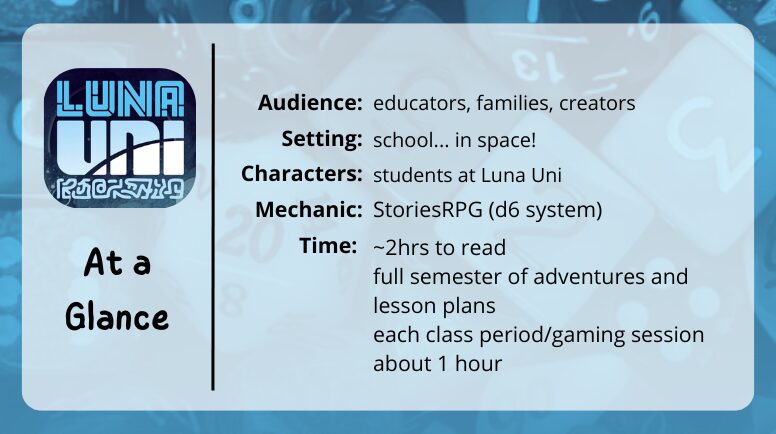
Audience for Luna Uni
Luna Uni is a combination of a game and educator guide for teaching literacy through tabletop RPGs! It’s made for teachers and caregivers who want to use applied TTRPGs and for creators/gamers who want to make their games intentionally usable by others who want to teach with games.
Luna Uni’s content standards list focuses on 5th grade literacy as it’s based, but it can also be applied to older or younger grades with modification.
The setting and story are all-ages focused in content, and mechanics use a d6 system (Stories RPG) that is made for ages 4+, so mechanics should also be accessible to a wide range of players.
Setting for Luna Uni
Luna Uni’s game portion is set on a space station school where players will take on the roles of students who are learning what it is to be them and exploring both what they can do and what’s out there.
The story content uses the kishoutenketsu storytelling method, which is more about facing unexpected shifts in the narrative and finding meaning and growth through a character’s journey versus the hero’s journey method, which focuses on facing conflict and reaching an end.
From using the kishoutenketsu method myself, I’ve found that this tends to create more of a looping story (versus the linear hero’s journey), which works well for classroom settings. You can get some level of closure and reflection at the end of a short story loop, probably within a class period or two, and then easily connect that into another loop as needed for future sessions and the continuation of the overall narrative.
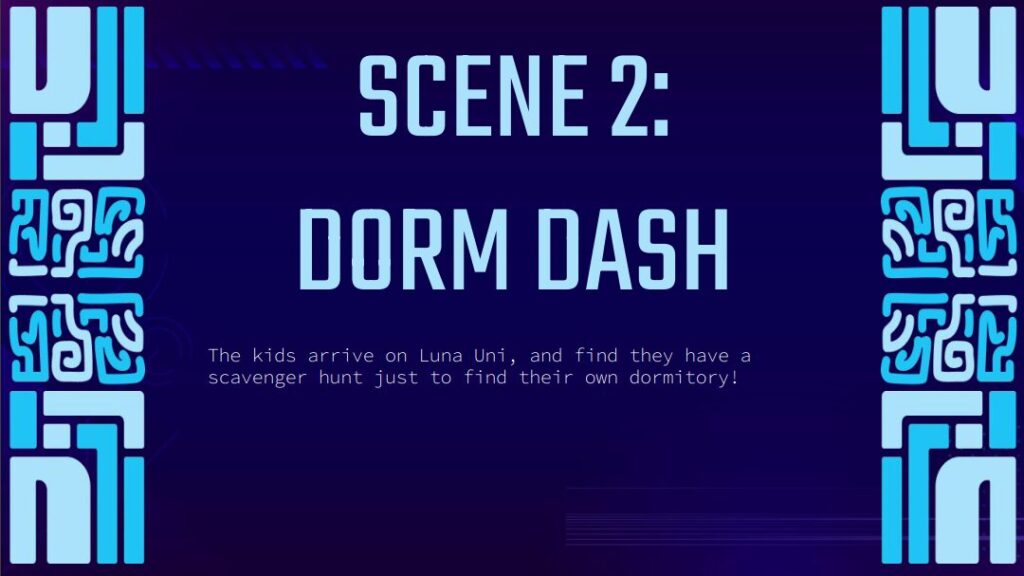
From a combination of the setting and the storytelling method, Luna Uni is going to create tales that focus on the characters, the discoveries they make, trouble they get into, and how they change over time. There’s still definitely drama and challenges to face throughout the game’s premade adventures (that line up with what’s needed for a whole semester of classes), but I see them generally as bright, lively, and curious challenges that connect to life at the Luna Uni school and the story universe that they’re all connected to.
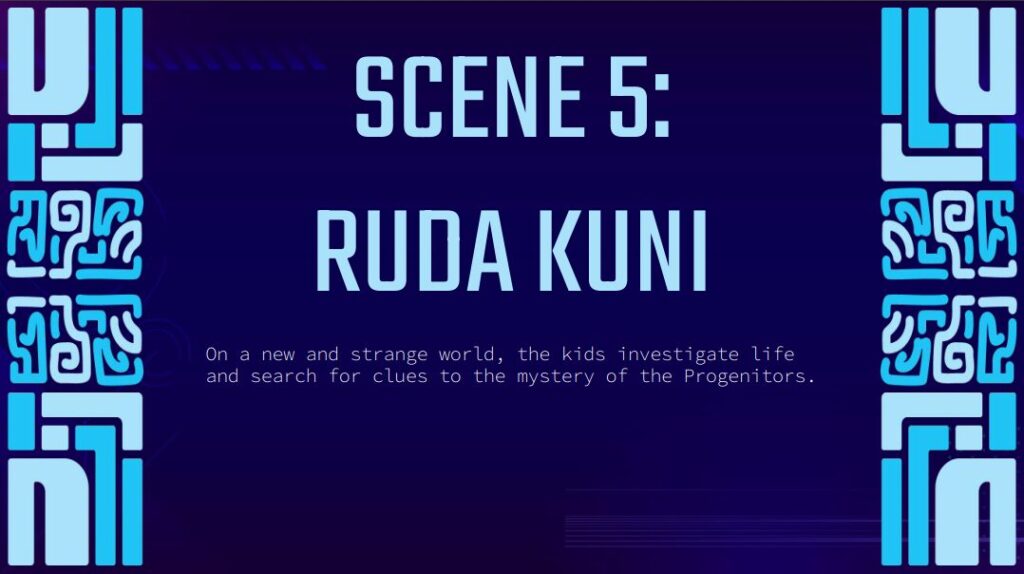
Characters in Luna Uni
Your characters in Luna Uni are students attending the in-game school that students will create themselves as part of the course lesson plan. The guide has a whole class devoted to character backstory creation with time to write and then share with others about their character.
Later in the course, as they get more in-tune with the process and their character’s story, students will write an essay about their character, getting into character analysis points that align with literacy education standards while further developing their character… and probably also their real-life connection to the game and lesson.

Looking at the play side of characters in the game, the Stories RPG system, which this is built on, uses character story lines (like “I am excellent at inventing” or “I stand out because of my giant lizard tail”) to give players bonus dice for their roles if they are able to explain how it applied to the move. This ties everything back to WHO the character is and rewards players for actively thinking about and participating in the storytelling process.
Mechanics in Luna Uni
I’ve stated before that Luna Uni uses the Stories RPG system, which I have already reviewed previously, so for this review I’m going to focus on the educational toolkit/lesson plan elements for the mechanics.
First, there’s full lesson plans throughout the teacher guide that breakdown supplies and time needed for each class, what content and standards are covered, and how to assess. There’s scripted read-alouds and notes on how to run each class along with side bar comments on how to handle common issues or concerns, like players leaning into violence, focusing only on “winning”, or making LOTS of pets/side characters to go along with their core character. This provides the instructor with all the information up front, making it a true classroom-ready tabletop RPG.
Lesson plans cover topics ranging from story and character analysis to developing public speaking and collaborative skills. Along with all of this, there’s a full slide deck that walks facilitators through a full semester of adventures, which can be used as-is or as a solid example for creating your own storyline.
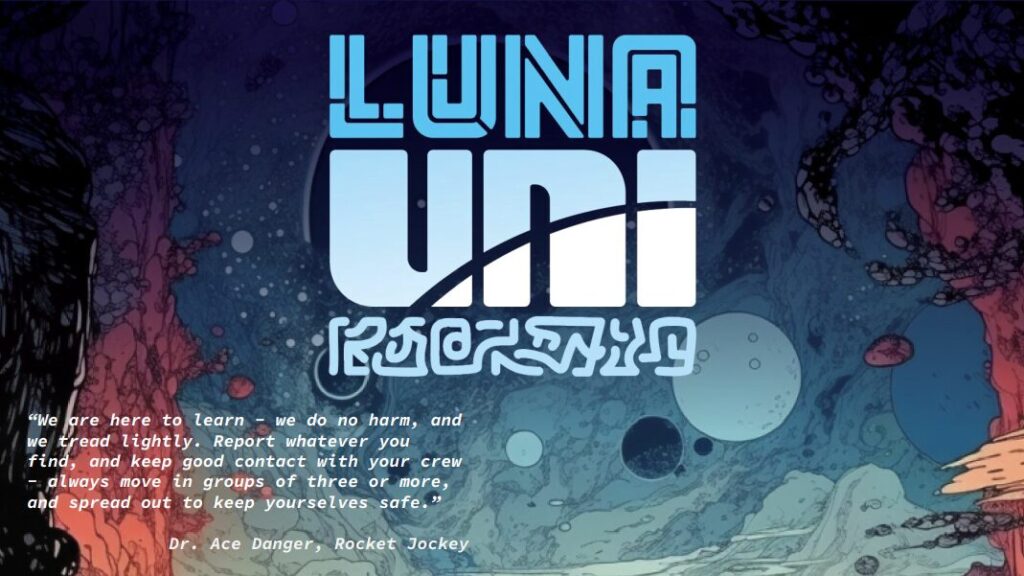
The guide also covers how to include accommodations for student needs and explains how this method of teaching naturally includes differentiated learning by allowing students to choose their writing challenges and analyze their own work. There’s even accompanying podcast epsidoes that can be used as an additional method for both the facilitator and class to learn how to play the game by example or interaction, also tapping into that accessibility angle.
While there is more to cover (since it’s a whole guide book, slide deck, and game system), the last point I’ll touch on here is grading since this is the most common topic I’ve had people ask about with regards to educational TTRPGs. There’s a benchmarking activity for use at the start of the semester, scoring instructions for evaluating for grades, and an end of term portfolio submission that students will assemble based on the pieces they decide to include for grading. It is very possible to include Luna Uni as part of a grade-based curriculum, and it tells you how to do that.
Overall thoughts on Luni Uni
Luna Uni is a great walkthrough for how to use TTRPGs in the classroom AND as an example of a fleshed out classroom-ready TTRPG. It creates a base, with plenty of tools, for teachers to run a full course that meets content standards while encouraging student creativity and engagement with the material through just having fun!
Find a copy of Luna Uni
You can find a copy of Luna Uni by contacting the creator through the Luck of Legends website.
If you liked this post, make sure to subscribe to the TTRPGkids monthly newsletter to stay up to date on the latest reviews, tips and tricks, game and podcast list updates, and more! Thank you for playing tabletop RPGs with your kids and sharing this awesome hobby with the next generation!
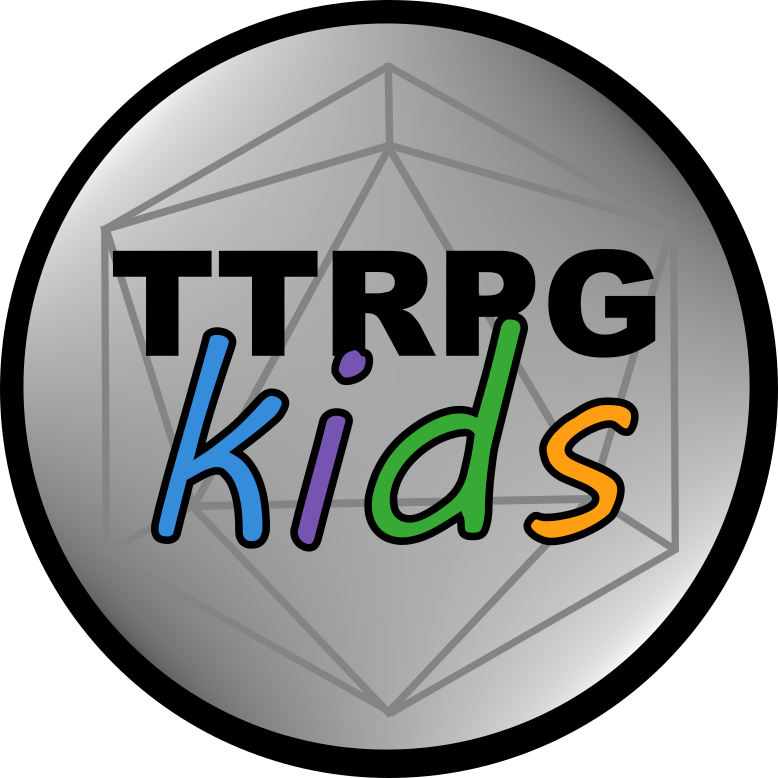


1 thought on “Review of Luna Uni: Educator Toolkit and Tabletop RPG”